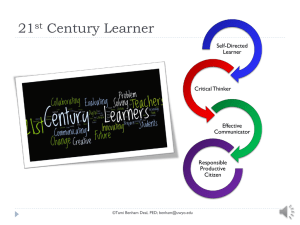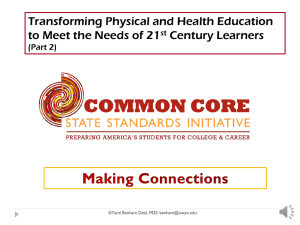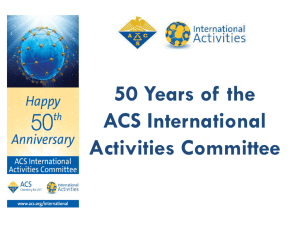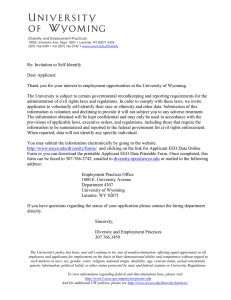2013 Central District Presentation - No Audio
advertisement
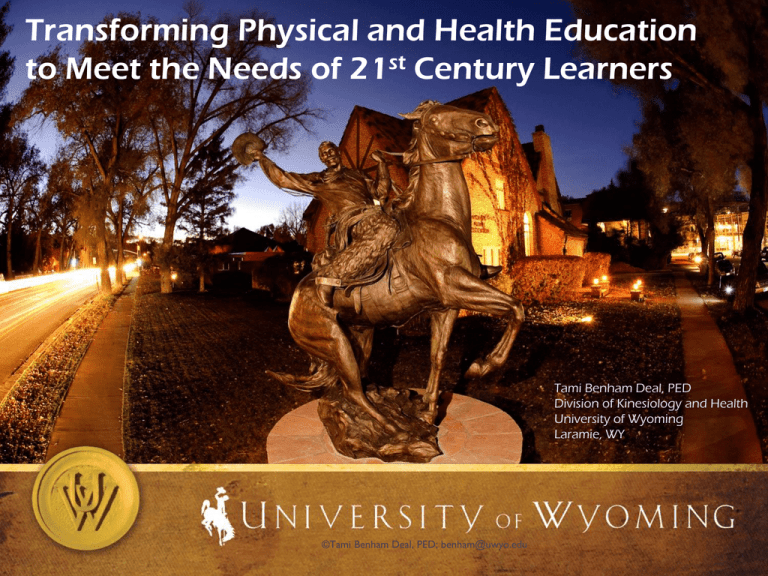
Transforming Physical and Health Education to Meet the Needs of 21st Century Learners Tami Benham Deal, PED Division of Kinesiology and Health University of Wyoming Laramie, WY ©Tami Benham Deal, PED; benham@uwyo.edu Photo source: http://joshfults.files.wordpress.com/2012/06/three-big-questions.jpg What will health and physical education look like in a transformed education system? What are the essential skills students will need in order to navigate the health challenges they will face in the 21st century? Why should health and physical educators understand the Common Core Standards (CCS) in English Language Arts and Math How can the CCS strengthen health and physical education standards and assessment in your state? ©Tami Benham Deal, PED; benham@uwyo.edu Transformational Education Education Reform Transforming Education ©Tami Benham Deal, PED; benham@uwyo.edu 21st Century Schools ©Tami Benham Deal, PED; benham@uwyo.edu Will 21st Century PE Classrooms look like this? ©Tami Benham Deal, PED; benham@uwyo.edu Or this? Photo Sources http://www.uruguayeduca.edu.uy/UserFiles/P0001/Image/EducacinFsica/GamerSize.jpg http://blog.rmhheartandvascular.com/wp-content/uploads/2011/04/exergaming.jpg ©Tami Benham Deal, PED; benham@uwyo.edu Mission of Schools To ensure that every student graduates, having met a higher set of expectations that prepare them for lifelong learning, meaningful work, and citizenship. Gene Wilhoit ©Tami Benham Deal, PED; benham@uwyo.edu Transforming Education for 21st Century Learners What are the essential skills students will need in order to navigate the health challenges they will face in the 21st century? ©Tami Benham Deal, PED; benham@uwyo.edu 21st Century Learner Self-Directed Learner Critical Thinker Effective Communicator Responsible Productive Citizen ©Tami Benham Deal, PED; benham@uwyo.edu Self-Directed Learner Self-directed learners engage in a continual process of: Self-management establish clear goals about their health thoroughly gather valid information about their health use a systematic approach to solving health related problems and making decisions about their health use articulate, thoughtful communication Self-monitoring consciously reflect on their health-related plans, decisions, and actions consider and evaluate the ramifications of their health-related thoughts, plans, decisions, and actions Self-modification revise decisions and strategies when needed to maintain or improve health and reduce health risk strive to maximize health based on feedback (from self and others) ©Tami Benham Deal, PED; benham@uwyo.edu What National or State Standards in health education reflect these skills? What National or State Standards in physical education reflect these skills? Where could these skills be applied in physical education? Critical Thinker Reasons Effectively Use various types of reasoning (inductive, deductive, etc.) to solve health related problems as appropriate to the situation Use Systems Thinking Analyze how factors work together and interact to make a person healthy or unhealthy Make Judgments and Decisions Effectively analyze and evaluate evidence, arguments, claims and beliefs about health Analyze and evaluate major alternative points of view about health issues Synthesize and make connections between health information and arguments Interpret health information and draw conclusions and solutions based relevant criteria and standards Reflect critically on health related information, decisions and actions Solve Problems Solve different kinds of non-familiar health related problems in both conventional and innovative ways Identify and ask significant questions that clarify various points of view and lead to better solutions Communicates effectively with others in figuring out solutions to complex health problems What National or State Standards in health education reflect these skills? What National or State Standards in physical education reflect these skills? Where could these skills be applied in physical education? ©Tami Benham Deal, PED; benham@uwyo.edu Source: http://www.p21.org/ Effective Communicator Clearly articulates thoughts and ideas about health using oral, written and nonverbal communication skills in a variety of forms and contexts Listen effectively to decipher meaning including health knowledge, values, attitudes and intentions Use communication for a range of purposes to inform, instruct, motivate and persuade Utilize multiple media and technologies to communicate and work collaboratively on health related issues know how to evaluate their effectiveness a priori as well as assess their impact Communicate effectively in diverse environments (including multi-lingual) ©Tami Benham Deal, PED; benham@uwyo.edu What National or State Standards in health education reflect these skills? What National or State Standards in physical education reflect these skills? Where could these skills be applied in physical education? Source: http://www.p21.org/ Responsible Productive Citizen Contributes to health of the community/nation What National or State Standards in health education reflect these skills? by taking action to prevent disease and injury to self and others by taking action to reduce the risk of disease and injury to self and others Advocates for community and environmental health ©Tami Benham Deal, PED; benham@uwyo.edu What National or State Standards in physical education reflect these skills? Where could these skills be applied in physical education? Health Education Standards for 21st Century Learners Health Information, Products and Resources Students access, analyze, and evaluate health information, products, and resources. Problem Solving and Decision Making Students use critical thinking and systematic processes to examine health related problems and make decisions that enhance health and reduce, or avoid health risks Effective Communication Students demonstrate the ability to use interpersonal communication skills to enhance health and reduce or avoid health risks . ©Tami Benham Deal, PED; benham@uwyo.edu Personal and Social Responsibility Students demonstrate the ability to use personal and social skills that are associated with taking responsible action for enhancing health and reducing or avoiding health risks. ©Tami Benham Deal, PED; benham@uwyo.edu ©Tami Benham Deal, PED; benham@uwyo.edu ©Tami Benham Deal, PED; benham@uwyo.edu ©Tami Benham Deal, PED; benham@uwyo.edu ©Tami Benham Deal, PED; benham@uwyo.edu Transforming Physical and Health Education to Meet the Needs of 21st Century Learners (Part 2) ©Tami Benham Deal, PED; benham@uwyo.edu English Language Arts Grade Level Standards in ELA Reading Writing Speaking and Listening Language ©Tami Benham Deal, PED; benham@uwyo.edu K-8, grade-by-grade 9-10 and 11-12 bands Reading Key Ideas and Details Craft and Structure Integration of Knowledge and Ideas Range of Reading and Level of Text Complexity Foundational Skills (K-5) Literature (K-5, 6-12) Literacy in History/Social Studies Informational Text (K-5, 6-12) Literacy in Science/ Technical Subjects ©Tami Benham Deal, PED; benham@uwyo.edu Reading: Informational Text Grade 2 Health Education Determine the meaning of words and phrases in a text relevant to a grade 2 topic or subject area. Use, Misuse, Abuse ©Tami Benham Deal, PED; benham@uwyo.edu Reading: Informational Text Grade 4 Health Education Determine the meaning of general academic and domain-specific words or phrases in a text relevant to a grade 4 topic or subject area. Medicine, Alcohol ©Tami Benham Deal, PED; benham@uwyo.edu Reading: Informational Text Grade 6 Determine the meaning of words and phrases as they are used in a text, including figurative, connotative, and technical meanings. Health Education “Use only as prescribed” “Recommended dose” http://kidshealth.org/teen/drug_alcohol/dr ugs/know_about_drugs.html# ©Tami Benham Deal, PED; benham@uwyo.edu Reading: Informational Text Grade 8 Determine the meaning of words and phrases as they are used in a text, including figurative, connotative, and technical meanings; analyze the impact of specific word choices on meaning and tone, including analogies or allusions to other texts. Health Education ©Tami Benham Deal, PED; benham@uwyo.edu Reading: Informational Text Grades 9-10 Health Education Determine the meaning of words and phrases as they are used in a text, including figurative, connotative, and technical meanings; analyze the cumulative impact of specific word choices on meaning and tone (e.g., how the language of a court opinion differs from that of a newspaper). ©Tami Benham Deal, PED; benham@uwyo.edu Reading Standards for Literacy in Science and Technical Subjects Making Connections To transform health and physical education How could you implement these standards in your physical education classroom? Grades 9-10 Translate quantitative or technical information expressed in words in a text into visual form (e.g., a table or chart) and translate information expressed visually or mathematically (e.g., in an equation) into words. Translate health benefits of exercise from a heart rate graph depicting percentage of time workout falls above, below, and within target Assess the extent to which the reasoning and evidence in a text support the author’s claim or a recommendation for solving a scientific or technical problem. Read an article on using steroids to enhance athletic performance to assess reasoning and evidence, like: Max Roosevelt. (2010, January 14). When the Gym Isn't Enough:[Style Desk]. New York Times) Compare and contrast findings presented in a text to those from other sources (including their own experiments), noting when the findings support or contradict previous explanations or accounts. Investigate if students accommodate for non-PE days by being more physically active after school on non-PE days than on PE days. Compare research to findings student collects with school pedometers. ©Tami Benham Deal, PED; benham@uwyo.edu Writing Text type and purposes Production and distribution of writing Research to build and present knowledge Range of writing Writing Standards (K-5, 6-12) Writing Standards for Literacy in History/Social Studies Writing Standards for Literacy in Science/ Technical Subjects ©Tami Benham Deal, PED; benham@uwyo.edu Writing Standards for Literacy History/Social Studies, Science, and Technical Subjects • Gather relevant information from authoritative print and digital sources, using advanced searches effectively Text Types and Purposes Production and Distribution of Writing Research to Build and Present Knowledge Range of Writing • Assess strengths and limitations of each source in terms of the task, purpose, and audience • Integrate information into the text selectively to maintain the flow of ideas, avoiding plagiarism and overreliance on any one source and following a standard format for citation ©Tami Benham Deal, PED; benham@uwyo.edu Making Connections To transform health and physical education • Gather relevant information from authoritative print and digital sources, using advanced searches effectively • Assess strengths and limitations of each source in terms of the task, purpose, and audience (and validity) WY Health Education Standard #1 HE.12.1.1 Locate and evaluate appropriate resources at school, in the community and beyond that help to enhance health (e.g., human resources, printed and electronic resources, equipment and facilities). HE.12.1.2 Locate and evaluate appropriate resources at school, in the community and beyond that help to reduce health risks (e.g., human resources, printed and electronic resources, equipment and facilities). HE.12.1.3 Use criteria to evaluate the validity of health information from a variety of sources (e.g., written, verbal, visual, electronic, etc.) ©Tami Benham Deal, PED; benham@uwyo.edu Making Connections To transform health and physical education W 9-10 Text Type and Purposes Write arguments focused on discipline-specific content a. b. Introduce precise claim(s), distinguish the claim(s) from alternate or opposing claims, and create an organization that establishes clear relationships among the claim(s), counterclaims, reasons, and evidence. Develop claim(s) & counterclaims fairly, supplying data and evidence for each while pointing out the strengths and limitations of both claim(s) & counterclaims in a disciplineappropriate form… WY HE 2 – PROBLEM SOLVING AND DECISION MAKING HE12.2.5: Apply a systematic process to evaluate the evidence, claims, beliefs and/or points of view about non-familiar health related issues or problems. ATOD, NUT, PA ©Tami Benham Deal, PED; benham@uwyo.edu Making Connections To transform health and physical education FTC Alleges Claims Are Not Backed by Adequate Scientific Evidence In a settlement reached with the Federal Trade Commission, mouthguard marketer Brain-Pad, Inc. and its President Joseph Manzo are barred from making unsupported claims that their mouthguards reduce the risk of concussions from lower jaw impacts, reduce the risk of concussions generally, or have been clinically proven to do either. As part of the FTC’s ongoing efforts to protect consumers from over-hyped health claims, the settlement also prohibits Brain-Pad and Manzo from misrepresenting the health benefits of any mouthguard or other athletic equipment designed to protect the brain from injury. http://www.ftc.gov/opa/2012/08/brainpad.shtm http://www.brainpads.com/ PE 11.2.3: Students will be knowledgeable consumers of fitness products and services. HE12.2.5: Apply a systematic process to evaluate the evidence, claims, beliefs and/or ©Tami Benham Deal, issues PED; benham@uwyo.edu points of view about non-familiar health related or problems. ATOD, NUT, PA Writing Standards for Literacy 6. Production and Distribution of Writing (gr 6) Use technology, including the Internet, to produce and publish writing and present the relationships between information and ideas clearly and efficiently. 6. Production and Distribution of Writing (gr 3) • With guidance and support from adults, use technology to produce and publish writing (using keyboard skills) as well as interact and collaborate with others. PE8.3. Students demonstrate 2 sportsmanship, cooperation, and teamwork in physical activity settings. http://www.yourcomicstrip.com/ PE4.2.2 Students demonstrate an understanding of the health benefits of being physically active. • http://launchpadtoys.com/toontastic/#in-action ©Tami Benham Deal, PED; benham@uwyo.edu Making Connections To transform health and physical education PE11.1.3 Students demonstrate an understanding of rules and strategies in: a. rhythms or dance, b. regulation or form team activities, c. regulation or form individual or dual activities, and d. lifetime activities. itunes - Idea Sketch https://itunes.apple.com/us/app/ideasketch/id367246522?mt=8 6. Production and Distribution of Writing (gr 11-12) • Use technology, including the Internet, to produce and publish, and update individual or shared writing products in response to feedback, including new arguments or information. ©Tami Benham Deal, PED; benham@uwyo.edu Speaking and Listening Presentation of Knowledge and Ideas 11-12 Present information, findings, and supporting evidence clearly, concisely, and logically such that listeners can follow the line of reasoning and the organization, development, substance, and style are appropriate to purpose, audience, and task. Presentation of Knowledge and Ideas 11-12 Evaluate a speaker’s point of view, reasoning, and use of evidence and rhetoric, identifying any fallacious reasoning or exaggerated or distorted evidence. WY HE 12.3.7 Delineate a speaker’s health argument and specific claims, distinguishing health claims that are supported by reasons and evidence from health claims that are not supported by reasons and evidence. ©Tami Benham Deal, PED; benham@uwyo.edu Speaking and Listening http://www.ted.com ©Tami Benham Deal, PED; benham@uwyo.edu Transforming Physical and Health Education to Meet the Needs of 21st Century Learners ©Tami Benham Deal, PED; benham@uwyo.edu Aligning Standards and Assessment Regional Workshops on Aligning 2012 WY Health Education Standards and Assessment to Common Core Standards in ELA and Literacy in History/Social Students, Science and Technical Subjects Contact Tami Benham Deal (benham@uwyo.edu) for more details. ©Tami Benham Deal, PED; benham@uwyo.edu Changes in the Wind! http://www.scassheap.org/ ©Tami Benham Deal, PED; benham@uwyo.edu Tami Benham Deal, PED Division of Kinesiology and Health University of Wyoming Laramie, WY 307-766-4284 benham@uwyo.edu ©Tami Benham Deal, PED; benham@uwyo.edu
